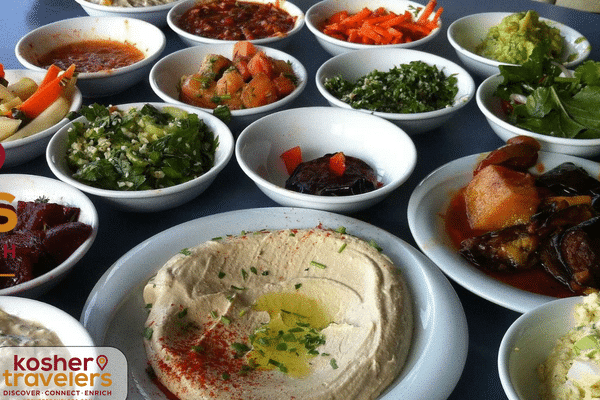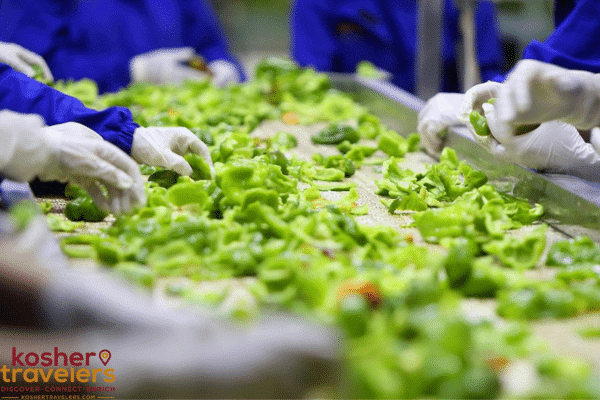The kosher heritage journey is a captivating voyage into the heart of tradition, culture, and spirituality, spanning the annals of time. Kosher, derived from the Hebrew word “kosher,” signifying “fit” or “proper,” encapsulates adherence to the dietary laws ingrained in Jewish tradition.
These dietary principles have traversed the ages, offering us a profound insight into the history and identity of Jewish communities.
In this blog, we will embark on an expedition into the world of kosher heritage journey, delving into its origins, deciphering its profound significance, and witnessing its metamorphosis through the generations.
The Kosher Heritage Journey: A Historical Perspective.
To truly appreciate the significance of keeping a kosher heritage journey within Jewish communities, it’s essential to explore its historical roots. The concept of kosher dietary laws has been integral to Jewish identity for millennia. Here, we’ll take a brief Kosher heritage journey to understand its evolution.
- Ancient Origins: The roots of kosher dietary laws can be traced back to the biblical era. In the Torah, there are explicit instructions regarding what animals are clean and fit for consumption.
- Rabbinic Interpretations: Over time, rabbinic scholars further elaborated on the dietary laws, providing guidelines for preparation, storage, and consumption. These interpretations, known as the Talmud, became essential in shaping kosher practices.
- Diaspora and Preservation: As Jewish communities spread throughout the world, the practice of kosher observance became a symbol of identity and continuity. It allowed Jewish families to maintain their cultural and religious Kosher heritage in foreign lands.
- Modern Challenges: In the modern era, with increased globalization and industrialization of food production, keeping kosher has presented unique challenges. Jewish communities have adapted to meet these challenges while upholding the core principles of kashrut.

Cultural Significance of Kosher Cuisine.
Kosher cuisine goes beyond dietary restrictions; it carries a profound cultural and religious significance for Jewish communities worldwide. Here are some insights into why kosher cuisine is more than just a set of rules:
- Identity and Connection: Kosher cuisine serves as a powerful link between generations, fostering a sense of identity and continuity among Jewish families. Preparing and sharing kosher meals with loved ones is a way of connecting with one’s Kosher heritage and ancestors.
- Ritual and Spirituality: Observing kosher dietary laws is a daily practice that deepens one’s connection to Jewish spirituality. It reminds individuals of their commitment to God and the covenant made with the Jewish people.
- Communal Bonding: Preparing meals for Shabbat dinners, festive holidays, and other special occasions has long been a cherished tradition in Jewish households, fostering a strong sense of community and togetherness.
- Education and Tradition: Within Jewish families, there is a time-honored practice of passing down the knowledge of kosher laws and culinary techniques from one generation to the next. It’s a heartfelt tradition where grandmothers lovingly teach their grandchildren the intricate secrets behind crafting the perfect matzah ball soup or baking challah bread, ensuring the preservation of these culinary traditions for generations to come.

The Modern Kosher Food Industry.
In recent times, the kosher food industry has witnessed substantial growth, propelled by the preferences of both Jewish consumers and those seeking high-quality, wholesome, and ethically produced foods. Kosher certification has evolved into a symbol of excellence, drawing the interest of a more extensive audience beyond the Jewish community.
- Health and Sustainability: The kosher dietary laws’ focus on cleanliness, purity, and ethical treatment of animals aligns with contemporary concerns about health and sustainability. Kosher food products are often perceived as more wholesome and ethically produced.
- Global Market: The demand for kosher products has expanded globally, with many non-Jewish consumers choosing kosher-certified items for their perceived quality and adherence to strict standards.
- Innovation in Kosher Cuisine: Modern chefs and food producers are incorporating kosher ingredients and techniques into innovative dishes and products. This fusion of tradition and innovation is shaping the future of kosher cuisine.
Kosher Cuisine: A Culinary Delight.
One of the most intriguing aspects of the kosher heritage journey is the incredible variety and richness of kosher cuisine. It’s a testament to the creativity and adaptability of Jewish communities as they navigate the boundaries of dietary laws. Let’s explore some iconic kosher dishes from different parts of the world:
- Gefilte Fish (Eastern Europe): This dish consists of groundfish, typically whitefish or carp, mixed with onions, matzo meal, and seasonings. It is then formed into patties or dumplings and poached in a flavorful broth. Gefilte fish is a beloved appetizer at Jewish holiday meals.
- Matzo Ball Soup (Ashkenazi Jewish): Often enjoyed during Passover, matzo ball soup features fluffy matzo meal dumplings floating in a clear chicken or vegetable broth. It’s a comforting and iconic Jewish dish.
- Shakshuka (Middle Eastern): This savory dish features poached eggs in a tomato and pepper sauce, spiced with paprika, cumin, and other seasonings. It’s a popular breakfast item in many Jewish communities.
- Challah (Various): Challah is a braided egg bread traditionally enjoyed on Shabbat (the Jewish Sabbath) and other special occasions. Its sweet and slightly dense texture makes it a beloved centerpiece of festive meals.
- Kosher Wine: Many Jewish celebrations involve the use of kosher wine, produced in accordance with strict kosher wine-making guidelines.
These are just a few examples of the diverse and delicious kosher dishes that have evolved over centuries. Each dish reflects the culinary Kosher heritage of a particular region and carries a unique story within the larger tapestry of kosher cuisine.
The Kosher Kitchen as Kosher Heritage.
A kosher kitchen is a hub of tradition and symbolism. It is meticulously organized and maintained to ensure the separation of dairy and meat products. Here are some key elements of a kosher kitchen:
- Utensils: Separate sets of utensils, dishes, and cookware are designated for dairy and meat. This includes pots, pans, knives, and even cutting boards.
- Preparation Surfaces: Kosher kitchens often have distinct counters or preparation areas for dairy and meat. These surfaces are regularly cleaned and may be covered with disposable liners to prevent cross-contamination.
- Dishwashers: In some kosher homes, two separate dishwashers are used to avoid mixing dairy and meat residue on dishes and utensils.
- Labeling: To prevent confusion, all products in the kitchen are carefully labeled as dairy, meat, or pareve (neither dairy or meat). This labeling extends to condiments, sauces, and packaged foods.
The kosher kitchen serves as the epicenter of Jewish culinary traditions and kosher heritage. Here are some ways in which the kosher kitchen embodies the essence of generational continuity:
- Family Recipes: Many kosher recipes have been handed down through generations, with each family adding its unique twist to traditional dishes. The process of teaching these recipes to younger generations fosters a sense of belonging and cultural identity. Classic dishes like matzo ball soup, gefilte fish, and kugel are often cherished family treasures.
- Passover Traditions: The Passover Seder, one of the most important Jewish holidays, is steeped in tradition and culinary significance. Families gather to retell the story of the Exodus from Egypt, using specific foods and rituals that have been preserved for centuries. The Seder plate, which includes items like matzo, bitter herbs, and charoset, is a symbol of these enduring traditions.
- Festive Celebrations: Kosher dietary laws influence the way Jewish holidays are celebrated. For example, on Hanukkah, the use of oil in cooking symbolizes the miracle of the oil that lasted for eight days in the Temple. Purim is marked by the exchange of gifts of food, such as hamantaschen cookies, among friends and family.
- Learning and Bonding: Preparing kosher meals often involves learning from elders and spending quality time together in the kitchen. The act of passing down culinary knowledge from one generation to the next strengthens family bonds and reinforces cultural Kosher heritage.
The Evolution of Kosher Practices.
Kosher dietary laws have undergone a dynamic process of adaptation and evolution across generations, responding to shifting circumstances, geographical dispersion, and cultural influences. Several pivotal factors have played a role in shaping this evolution:
- Migration and Diaspora: As Jewish communities dispersed throughout the world, they encountered new ingredients and culinary traditions. To adapt to local resources while maintaining their dietary laws, Jewish communities developed unique kosher practices influenced by their surroundings.
- Technological Advancements: The industrial revolution and modern food processing techniques have introduced new challenges and opportunities for kosher observance. Kosher certification agencies now play a crucial role in ensuring that processed foods meet kosher standards.
- Globalization and Trade: The interconnectedness of the modern world has allowed for the distribution of kosher products on a global scale. Kosher certification marks, such as the familiar “OU” symbol, are recognized worldwide, making it easier for Jewish consumers to identify kosher products.
Conclusion.
The kosher heritage journey is not merely a historical expedition; it is a vibrant celebration of tradition, faith, and cultural resilience. From its ancient origins in sacred texts to its contemporary presence in the global culinary landscape, the kosher heritage journey stands as a testament to the enduring spirit of Jewish communities.
As the flame of tradition is handed down from one generation to the next, it not only upholds the practice of religion but also acts as a guiding light for the preservation of cultural identity and the bonds it fosters of Kosher heritage.
In the age of digital technology, the spread of the kosher heritage journey has soared to unprecedented levels, guaranteeing the endurance of this extraordinary tradition while keeping it fresh and pertinent, thus shedding light on the journey for future generations.










